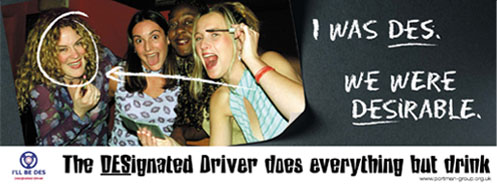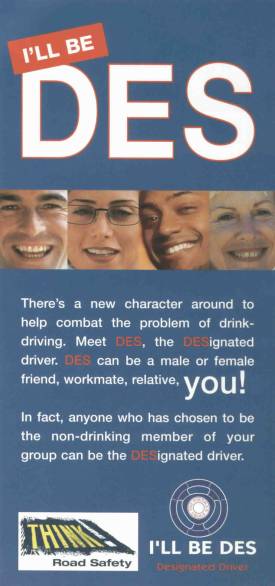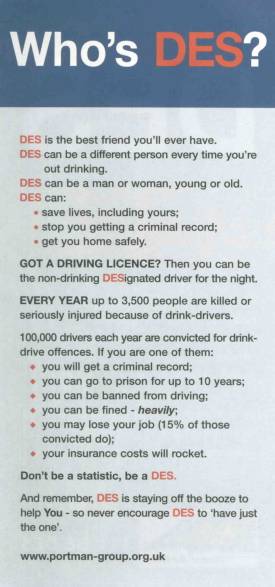Who'll be Des?

 The idea of the "designated driver" is currently being strongly promoted by the Portman Group, the drinks industry funded body that aims to discourage alcohol misuse. Undoubtedly this is a praiseworthy initivative and there are plenty of circumstances where it will prove convenient for people and help reduce road casualties.
The idea of the "designated driver" is currently being strongly promoted by the Portman Group, the drinks industry funded body that aims to discourage alcohol misuse. Undoubtedly this is a praiseworthy initivative and there are plenty of circumstances where it will prove convenient for people and help reduce road casualties.
However, it does have inherent limitations. It is only appropriate if a group of friends or relatives, who live fairly close to each other, wish to travel together to a location that is too far to walk. In many cases, if it isn't too far, getting a taxi will be little less convenient, and will enable them all to drink without any concern for the breathalyser. Probably just as common is a situation where people who live in scattered locations wish to meet at a central point, where it simply will not work.
Many social groups will contain some non-drivers, and others who are reluctant to forgo drinking and therefore are unwilling to take their turn at driving, meaning that some people may end up doing more than their fair share of being "Des". In today's fragmented society it could be extremely difficult to find anyone else prepared to take a turn once in a while.
It could even serve to encourage excessive drinking, as those who are not driving on that particular occasion may feel they want to take maximum advantage, and could promote the attitude that a drinking session is an occasional binge rather than a routine part of daily life, something that lies behind much of the drink-related trouble we now see on our streets.
It is also a predictable sign of present-day political correctness that the publicity material has to say "don't encourage Des to have just the one drink". In reality there is no legal or safety reason why Des should not have "just the one", and the message would be more credible if it said that Des should not consume more than three units of alcohol over the course of an evening. Indeed, over the festive season and indeed throughout the year, large numbers of people will be happy to entrust themselves to a "Des" who has had one or two drinks, but remains well below the legal limit.
So while it may be a useful strategy for some people, in some situations, it is far from being a general panacea for drink-driving.
Shown below is a copy of a leaflet that has been widely distributed in licensed premises. There is a further misleading element in this as it states that the maximum prison sentence for drink-driving offences is ten years. This is true, but applies only to the offences of causing death by dangerous or careless driving when under the influence of drink or drugs. The maximum sentence for a "standard" offence is six months.


(December 2001)